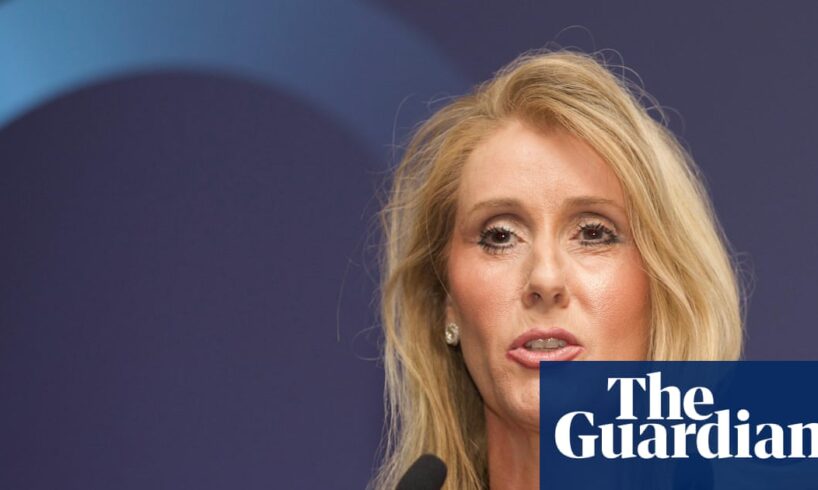
It has been a career-defining summer for Debbie Crosbie. Three years after taking over as the chief executive of Nationwide Building Society, the straight-talking Glaswegian has become a darling of the Labour government: awarded a damehood, namechecked in the chancellor’s Mansion House speech and hailed for furthering a Labour party manifesto pledge to double the size of the mutuals sector.
But outside Westminster’s warm embrace, a storm has been brewing. A 43% increase to Crosbie’s maximum pay package, worth up to £7m per year, is due to be rubber-stamped without a binding vote by members, effectively sidelining any opposition at Nationwide’s annual shareholder meeting on Friday. It has prompted outrage among campaigners who say it is the latest sign that the 140-year-old building society is losing its way.
Those critics believe Nationwide, which was founded in 1884 in south London as the Southern Co-operative Permanent Building Society, has deviated from its roots.
Although owned by its members, it bought Virgin Money for £2.9bn last year without asking for their approval and critics claim it is centralising power at the top while diluting the voice of its members.
Rachel Reeves delivering her Mansion House speech next to Debbie Crosbie in November 2024. Photograph: Isabel Infantes/Reuters
But the industry is backing Crosbie, recognising the 55-year-old former TSB boss’s role in pulling the sector into the political limelight.
“The truth is that mutuals have often been seen as niche: a ‘nice to have but not essential’,” says Peter Hunt, the founder of UK-based mutuals consultancy Mutuo.
Now industry bosses are hosted at No 10 summer garden parties and asked to join a government-run Mutual and Cooperative Sector Business Council. This autumn, ministers will launch a consultation on how to double the size of the sector, in line with Labour’s manifesto pledge. This kind of state-level attention, Hunt says, “has moved the dial”.
It is a sign that the sector has finally recovered from a wave of demutualisations in the 1990s that turned the likes of Abbey National, Bradford & Bingley, Halifax and Northern Rock into shareholder-owned banks. It was a blow to the UK’s building societies movement, which traces its history back to Birmingham in 1775 when a group of friends, desperate to get on the housing ladder, pooled their resources to buy land and building materials.
But by the time the 2008 financial crisis erupted, most demutualised firms were either acquired or nationalised through state bailouts. It left survivors such as Nationwide proud of how their simpler, more risk-averse business models, focused on savings and home loans, survived the financial implosion.
Seventeen years later, Nationwide is the jewel in the sector’s crown, with 17 million members and £368bn in assets. It is the second largest mortgage provider behind Lloyds, with a 12.5% share of the market. “Nationwide is a domestically systemic banking institution,” the Building Societies Association (BSA) chief executive, Robin Fieth, says. “It gives scale and importance to the whole of our sector.”
But some believe Nationwide’s growth has come at the expense of its democratic roots. While building societies centre on the idea of “one member, one vote”, there has been “a boiling frog problem”, according to James Sherwin-Smith, a longtime Nationwide customer who has campaigned to join the board as a voice for members.
He says Nationwide has been “debasing … member rights … despite all the lovely positive PR that Nationwide puts out about having your say, and that they’re a beacon for mutual good. When I scratch the surface of that, I do not find substance.”
Fury erupted last year over Nationwide’s decision to not hold a member vote over its takeover of Virgin Money, while the takeover target’s own shareholders had a say. But there are other longstanding issues, including Nationwide’s use of “quick vote” options, which make it easier to back the board’s recommendations rather than cast individual or dissenting votes at its annual general meeting.
There are also concerns that Nationwide has retained online-only AGMs, even after Covid lockdowns were lifted, in a move that risks disenfranchising members without internet access. Meanwhile, some members say it can be difficult to get a resolution or election on the ballot, requiring 250 to 500 endorsements from members, whose contact details can be a challenge to access due to data rules. Their signatures only qualify under strict conditions and can be disqualified if their balances or loans fall below a certain level – £100 or £200 in most cases – over the preceding two years.
skip past newsletter promotion
Sign up to Business Today
Get set for the working day – we’ll point you to all the business news and analysis you need every morning
Privacy Notice: Newsletters may contain info about charities, online ads, and content funded by outside parties. For more information see our Privacy Policy. We use Google reCaptcha to protect our website and the Google Privacy Policy and Terms of Service apply.
after newsletter promotion
Edwin Fisher of the Building Societies Members Association says that while Nationwide is the biggest of the mutuals sector, it is also the “most controversial, and has, in our opinion, the lowest standards of corporate governance”.
“They regularly churn out the line that members are the owners, but we all know that members have no say in anything,” Fisher adds, noting that if the UK faced another wave of demutualisation, Nationwide “would be ripe” to exit.
Nationwide has not expressed any intention of demutualising. But its board says banker-level pay is necessary if it hopes to compete with the likes of Lloyds and NatWest.
Fisher says members only want Nationwide to compete with banks on size, but not on pay or purpose. Furthermore, Nationwide’s operations are far less complex than most banks: Crosbie does not have to manage an investment bank or international operations, nor relationships with shareholders. Even after the Virgin Money takeover, it remains a much simpler operation focused on mortgages.
But Hunt says it would be inappropriate to measure Crosbie and her pay against bosses at much smaller building societies. “She’s the Lionel Messi of British building societies,” he said. “And she could play for any of the banks, so this is how they keep her in the Nationwide shirt.”
The problem for democratically minded members is that the Building Societies Act may not be fit for Nationwide’s size. It means that, unlike its listed bank rivals, Nationwide is not required to hold binding votes on new pay proposals, like the one that could hand Crosbie up to £7m. While it could volunteer to hold a binding vote, Nationwide has refused.
When asked whether the Building Societies Association would support reforming the act, Fieth said “it’s not a measure we’d oppose” but admitted it was not “No 1 on our shopping list”.
Hunt also questioned whether members were “equipped” to have a binding say on pay. “If I was a member of Nationwide, how would I be equipped to know what any executive should get paid? How would I know? Just because I didn’t like the number? If you had a vote on MPs’ pay, I guarantee you the vast majority of the public will want them to [be paid] less,” he said. (The basic salary for an MP is £93,904.)
Fieth echoed that argument, saying some members “found it difficult” to relate to the sums involved. “When you’ve got a balance sheet that’s £300bn, most people can’t compute that at all.”
He said members should still be asking questions, but needed to keep long-term performance and innovation in mind. “Henry Ford said that if you’d asked people what they wanted at the beginning of the 20th century, they’d have said faster horses.”
Sherwin-Smith said it was the board’s burden to keep members informed. “They should educate people and let them [hold a binding] vote, but to say you’re too stupid to have a say is the wrong attitude.”
Nationwide declined the Guardian’s interview requests, but said it regularly engages with a panel of 6,500 members and surveys 500,000 members each year. It also said members have a chance to vote to re-elect board directors every year.
“From the extensive engagement that we have with our members, we cannot see any evidence that our leading customer service, support for first-time buyers, growing market shares and record member financial value is in any way controversial,” Nationwide said.
It previously said pay proposals although advisory, “always received overwhelming member support” and that Nationwide’s strong performance was driven in part by its ability to “attract, retain and motivate talented leaders.”





